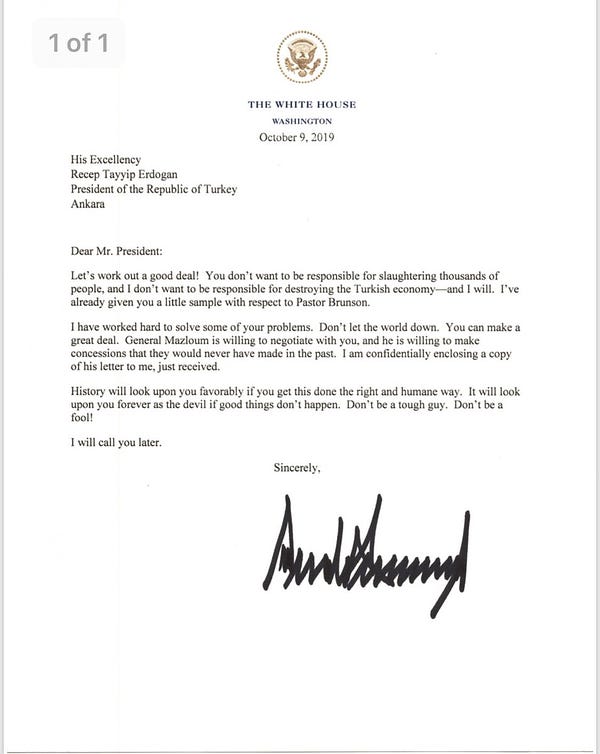So, there are many remarkable things about this document produced by the Trump White House:


And I mean that in the very classic sense that there is much about it that is worth remarking upon. And so many of the more obvious remarks have already been made, particularly in the fields of "Is this real?" and "You've got to be kidding me."
For that reason, I'm going to confine my remarks upon it to one or two closely related areas, optics and projection.
It might seem strange to give the "deep dive" treatment to something so brief and shallow, but I wouldn't be myself if I didn't analyze a text in front of me, and you wouldn't be here if I didn't do that.
The thing that strikes me about it is that his primary concern here is the optics of the situation. His appeal to Erdogan is not rooted in "do the right thing" but in "do you want to be remembered as being responsible for this?"
This gives us a lens for understanding how and why Trump is taking this approach: he is getting hammered, even by many of his usual defenders and enablers, for his decision here and he fears it's affecting his reputation and legacy.
He's bringing this up here in regards to his Turkish counterpart both because that['s the level on which he's operating and because he hopes to turn things around if he can't make a good deal, and cast Erdogan as the villain in the popular mind.
That there's enough blame for both of them is not something he's concerned about because in his mind, this letter show that he tried to prevent the bloodshed and thereby transfers his share of the blame.
And it will work with his base. The story on the ground in Trumpland will be that he was the one reaching out to Turkey and trying to stop the slaughter while Congress and the Democrats played the blame game.
Now, the deeper concern I see underneath this focus on optics and dealmaking is the fact that when it comes to deals, Trump does care about appearances more than practical results. If there were any material gain for him he'd want that for real, but when it comes to getting a job done that primarily benefits others, he mainly wants to be able to say he did it, and he expects the same to be true of all parties involved.
Witness his attempts to make a deal on border funding with Democrats, where his pitch was "give me some money and we'll call it a fence or enhanced security or something other than a wall, so you can tell your people you won and I can tell my people I won and everybody will be happy."
I fear that with his talk of making a great deal that will change how the Turkish presient is remembered, what Trump is actually holding out is an invitation to find a way to reframe things. The letter is in writing, set down in black and white, but the dealmaking will happen over the phone. Afterwards, it can be spun out in text.
As we've seen with the Sondland texts, Team Trump likes to take things to phone in order to make sure there is no natural transcription of the message that exists outside their control. So the "deal" could very easily be an agreement to reframe what is happening in a way that gives both sides enough political cover to weather the worst of the fallout.
We've already seen Trump allies trying out lines like calling the Kurds terorrists. Howhard is it to imagine an agreement that Turkey will only attack the worst criminals? And just like when Trump made the same pledge about his own DHS: anyone they attack wil lby definition become such a criminal.
Now the people condemning the offensive are terrorist sympathizers. Now Turkey is an valued partner in the war on terror. Now the blame for unleashing the captured ISIS militants falls squarely on the heads of those being slaughtered.
Will it work?
It will in some quarters. Plenty of Republicans who seem to have found their spines only did so while looking for a fig leaf.
Whether it's enough or not, Trump's nature is to proceed as though he will get away with something right up until the point when he doesn't. Historically, for the most point, this has worked out well for him, because for the most part anyone with the power to enforce the rules has depended to some extent on the idea that when people get caught, they stop. They might fight, they might not come quietly, they might admit nothing and try something else, but when most people are caught dead to rights, for the most part they don't carry on exactly as if they weren't.
This fact not only tends to leave his opponents at a loss, but it works to convince witnesses that even if he's not as innocent as he says then he can't be as guilty as anyone else says. Otherwise someone would have stopped him.
I can't predict the future, but mark my words: what Trump is looking for in terms of a diplomatic resolution is not something that saves the Kurds or saves Erdogan, but something that saves himself. He's looking for a Nixonian "peace with honor", a way to spin rather than avert disaster caused by his retreat.
Thank You For Reading This!
You can receive future newsletters like this straight to your inbox as they go out for free. If you especially enjoy them and you wish to help me continue writing them, you can choose to purchase a paid subscription for $5 a month or $50 per year. Now through October 21st, when you purchase a paid subscription you will receive 20% off the cost of the subscription for as long as you keep it. That’s $4 a month or $40 per year!


